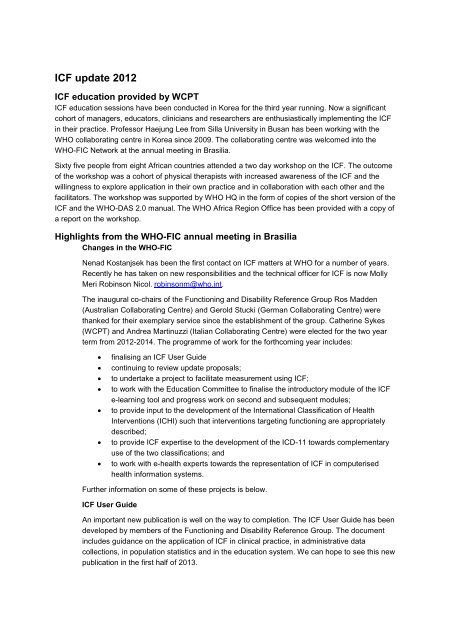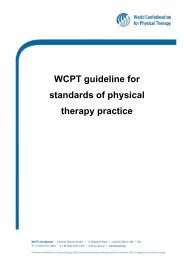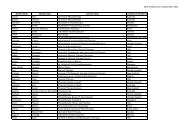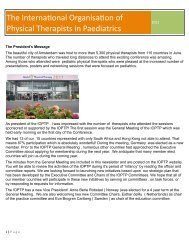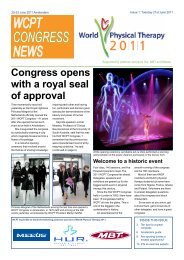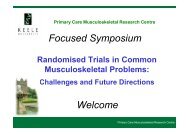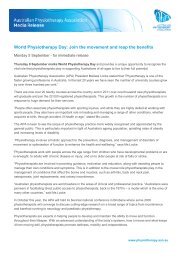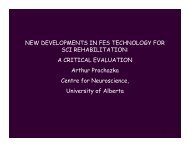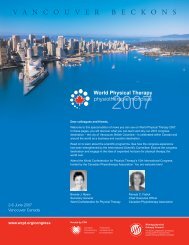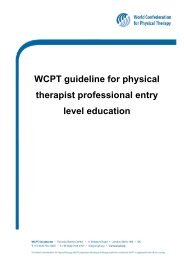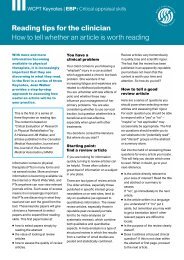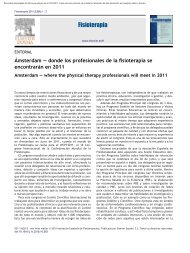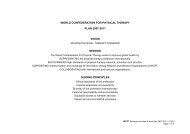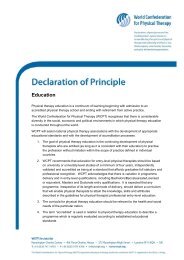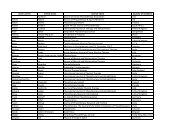Latest WCPT update on ICF - World Confederation for Physical ...
Latest WCPT update on ICF - World Confederation for Physical ...
Latest WCPT update on ICF - World Confederation for Physical ...
You also want an ePaper? Increase the reach of your titles
YUMPU automatically turns print PDFs into web optimized ePapers that Google loves.
<strong>ICF</strong> <str<strong>on</strong>g>update</str<strong>on</strong>g> 2012<strong>ICF</strong> educati<strong>on</strong> provided by <str<strong>on</strong>g>WCPT</str<strong>on</strong>g><strong>ICF</strong> educati<strong>on</strong> sessi<strong>on</strong>s have been c<strong>on</strong>ducted in Korea <strong>for</strong> the third year running. Now a significantcohort of managers, educators, clinicians and researchers are enthusiastically implementing the <strong>ICF</strong>in their practice. Professor Haejung Lee from Silla University in Busan has been working with theWHO collaborating centre in Korea since 2009. The collaborating centre was welcomed into theWHO-FIC Network at the annual meeting in Brasilia.Sixty five people from eight African countries attended a two day workshop <strong>on</strong> the <strong>ICF</strong>. The outcomeof the workshop was a cohort of physical therapists with increased awareness of the <strong>ICF</strong> and thewillingness to explore applicati<strong>on</strong> in their own practice and in collaborati<strong>on</strong> with each other and thefacilitators. The workshop was supported by WHO HQ in the <strong>for</strong>m of copies of the short versi<strong>on</strong> of the<strong>ICF</strong> and the WHO-DAS 2.0 manual. The WHO Africa Regi<strong>on</strong> Office has been provided with a copy ofa report <strong>on</strong> the workshop.Highlights from the WHO-FIC annual meeting in BrasiliaChanges in the WHO-FICNenad Kostanjsek has been the first c<strong>on</strong>tact <strong>on</strong> <strong>ICF</strong> matters at WHO <strong>for</strong> a number of years.Recently he has taken <strong>on</strong> new resp<strong>on</strong>sibilities and the technical officer <strong>for</strong> <strong>ICF</strong> is now MollyMeri Robins<strong>on</strong> Nicol. robins<strong>on</strong>m@who.int.The inaugural co-chairs of the Functi<strong>on</strong>ing and Disability Reference Group Ros Madden(Australian Collaborating Centre) and Gerold Stucki (German Collaborating Centre) werethanked <strong>for</strong> their exemplary service since the establishment of the group. Catherine Sykes(<str<strong>on</strong>g>WCPT</str<strong>on</strong>g>) and Andrea Martinuzzi (Italian Collaborating Centre) were elected <strong>for</strong> the two yearterm from 2012-2014. The programme of work <strong>for</strong> the <strong>for</strong>thcoming year includes:• finalising an <strong>ICF</strong> User Guide• c<strong>on</strong>tinuing to review <str<strong>on</strong>g>update</str<strong>on</strong>g> proposals;• to undertake a project to facilitate measurement using <strong>ICF</strong>;• to work with the Educati<strong>on</strong> Committee to finalise the introductory module of the <strong>ICF</strong>e-learning tool and progress work <strong>on</strong> sec<strong>on</strong>d and subsequent modules;• to provide input to the development of the Internati<strong>on</strong>al Classificati<strong>on</strong> of HealthInterventi<strong>on</strong>s (ICHI) such that interventi<strong>on</strong>s targeting functi<strong>on</strong>ing are appropriatelydescribed;• to provide <strong>ICF</strong> expertise to the development of the ICD-11 towards complementaryuse of the two classificati<strong>on</strong>s; and• to work with e-health experts towards the representati<strong>on</strong> of <strong>ICF</strong> in computerisedhealth in<strong>for</strong>mati<strong>on</strong> systems.Further in<strong>for</strong>mati<strong>on</strong> <strong>on</strong> some of these projects is below.<strong>ICF</strong> User GuideAn important new publicati<strong>on</strong> is well <strong>on</strong> the way to completi<strong>on</strong>. The <strong>ICF</strong> User Guide has beendeveloped by members of the Functi<strong>on</strong>ing and Disability Reference Group. The documentincludes guidance <strong>on</strong> the applicati<strong>on</strong> of <strong>ICF</strong> in clinical practice, in administrative datacollecti<strong>on</strong>s, in populati<strong>on</strong> statistics and in the educati<strong>on</strong> system. We can hope to see this newpublicati<strong>on</strong> in the first half of 2013.
<strong>ICF</strong> <str<strong>on</strong>g>update</str<strong>on</strong>g>sIn order to keep <strong>ICF</strong> accurate and current the WHO has instigated an <str<strong>on</strong>g>update</str<strong>on</strong>g> process,whereby any<strong>on</strong>e using the classificati<strong>on</strong> can propose a change to the <strong>ICF</strong>. Proposals must besubstantiated by evidence. During 2010 and 2011 the WHO’s Functi<strong>on</strong>ing and DisabilityReference Group (FDRG) successfully moved several plat<strong>for</strong>m proposals through the <strong>for</strong>malWHO-FIC Network review procedures. You can see the review procedures outlined in the <strong>ICF</strong>Update Plat<strong>for</strong>m User Guide.<strong>Physical</strong> therapists interested in ensuring that the <strong>ICF</strong> remains current and appropriate <strong>for</strong>describing functi<strong>on</strong>ing and disability are encouraged to register <strong>on</strong> the <strong>ICF</strong> <str<strong>on</strong>g>update</str<strong>on</strong>g> plat<strong>for</strong>mand engage in the discussi<strong>on</strong>s and make proposals.• Registering as a reviewer <strong>on</strong> the <strong>ICF</strong> Update Plat<strong>for</strong>mIf you have not yet registered to serve as a reviewer <strong>on</strong> the <strong>ICF</strong> Update Plat<strong>for</strong>m, youwill need to request registrati<strong>on</strong> from WHO. In that case, click <strong>on</strong> the web link <strong>for</strong> theWHO <strong>ICF</strong> Update Plat<strong>for</strong>m: https://extranet.who.int/icfrevisi<strong>on</strong> to enter the login page<strong>for</strong> the <strong>ICF</strong> Update Plat<strong>for</strong>m, then click <strong>on</strong> the link that reads “Not a member? Createan account.” https://extranet.who.int/icfrevisi<strong>on</strong>/nr/createAccount.aspx. Your requestgoes directly to Can Çelik at WHO celikc@who.int.If you are already registered as a reviewer <strong>on</strong> the <strong>ICF</strong> Update Plat<strong>for</strong>m, you can beginyour reviewing immediately.If you cannot remember your username or password, enter the login page <strong>for</strong> the <strong>ICF</strong>Update Plat<strong>for</strong>m, then click <strong>on</strong> the link that reads “Forgot your User Name orPassword?” You can also send an E-Mail request to Can Çelik at WHO.<strong>ICF</strong> e-Learning toolThe <strong>ICF</strong> e-Learning tool available at http://p.ideaday.de/104.2/icf/, has underg<strong>on</strong>e pilottesting. It is currently under review by WHO. Some organisati<strong>on</strong>s have started <strong>on</strong> translati<strong>on</strong>s,however it is important to note that the e-learning tool is still draft. Translators may wish totake into account that there will be some changes being made be<strong>for</strong>e the tool will be releasedmore generally.Posters presented at the 2012 WHO-FIC Network meeting<strong>ICF</strong> posters presented at the WHO-FIC meeting, Brasilia, Brazil, 13-19 October 2012. Copiesof the posters can be found at: http://www.who-fic.com.br/index.php/papers-posters orhttp://apps.who.int/classificati<strong>on</strong>s/network/meeting2012/en/ A list of titles and authors isappended (Appendix 1).Collaborating Centre NewslettersNorth America – c<strong>on</strong>tent includes links to book review, publicati<strong>on</strong>s and web resources andthe regular feature ‘Coder’s corner’, where examples of coding are provided and discussed.<str<strong>on</strong>g>Latest</str<strong>on</strong>g> editi<strong>on</strong> available http://www.cdc.gov/nchs/data/icd9/icf_newsletter_oct2012.pdf.Dutch – c<strong>on</strong>tent includes, latest editi<strong>on</strong> available from http://www.rivm.nl/who-fic. The currentediti<strong>on</strong> is the last that will be produced in paper <strong>for</strong>mat. You are encouraged to register toreceive an electr<strong>on</strong>ic versi<strong>on</strong> of the newsletter, should you be interested.<strong>ICF</strong> in IndiaThe South Asia Centre <strong>for</strong> Disability Inclusive Development & Research (SACDIR) opened in 2010.One of its objectives is to ‘Organize modules <strong>on</strong> applicati<strong>on</strong> of the Internati<strong>on</strong>al Classificati<strong>on</strong> of
Functi<strong>on</strong>ing (<strong>ICF</strong>) recommended by WHO’. Other objectives aim to improve the lives of people withdisabilities through research, educati<strong>on</strong> and training and advocacy.Punarbhava meaning 'renewed being' is a nati<strong>on</strong>al web portal <strong>on</strong> disabilities. The portal is a place togather in<strong>for</strong>mati<strong>on</strong>, discuss issues, network, find employment, look <strong>for</strong> appliances and assistivedevices, seek redress of grievances, undergo training, research and study, am<strong>on</strong>gst other things. The<strong>ICF</strong> is acknowledged as a new way of c<strong>on</strong>sidering health and functi<strong>on</strong>ing. WHO resources areincluded <strong>on</strong> the website.The Government of India Central Bureau of Health Intelligence is c<strong>on</strong>ducting training courses <strong>on</strong> theWHO Family of Internati<strong>on</strong>al Classificati<strong>on</strong>s including <strong>ICF</strong> and its compani<strong>on</strong> reference classificati<strong>on</strong>the Internati<strong>on</strong>al Classificati<strong>on</strong> of Diseases (ICD). A <strong>on</strong>e week master trainer course is alsoc<strong>on</strong>ducted. The schedule <strong>for</strong> 2012-2013 is available from the website.UNICEF and WHO discussi<strong>on</strong> paperUNICEF and the <strong>World</strong> Health Organizati<strong>on</strong> have collaborated <strong>on</strong> a discussi<strong>on</strong> paper <strong>on</strong> EarlyChildhood Development and Disability. The <strong>ICF</strong> definiti<strong>on</strong>s and framework are used to definedisability.<strong>ICF</strong>-CY Developmental Code SetsSub sets of <strong>ICF</strong> that define standard minimum c<strong>on</strong>tent areas to document child functi<strong>on</strong>ing bydevelopmental age group have been developed as a strategy to increase the utility of the <strong>ICF</strong>-CY inclinical and research settings.‘In 2010, an internati<strong>on</strong>al study was c<strong>on</strong>ducted to derive reduced item developmental code sets fromthe <strong>ICF</strong>-CY (Ellingsen, K.E. & Sime<strong>on</strong>ss<strong>on</strong>, R.J). This study builds <strong>on</strong> field trial work of <strong>ICF</strong> versi<strong>on</strong><strong>for</strong> children and youth (<strong>ICF</strong>-CY) in Sweden (Björck-Åkess<strong>on</strong>, Granlund, & Ibragimovaand, 2005) andI-CY-HAB <strong>for</strong>ms 1-3 developed at Mälardalen University (Adolfss<strong>on</strong>, Pless, Ibragimova, Granlund, &Bjorck-Akess<strong>on</strong>, 2007). Age-based reduced item sets were developed by c<strong>on</strong>sensus from a diverseinternati<strong>on</strong>al group of experts. Professi<strong>on</strong>als from all major regi<strong>on</strong>s of the world participated in a threeroundDelphi procedure, prioritizing <strong>ICF</strong>-CY codes <strong>for</strong> four different age groups. The derived <strong>ICF</strong>-CYDevelopmental Code Sets included codes from the domains of Activities/Participati<strong>on</strong>, BodyFuncti<strong>on</strong>s and Envir<strong>on</strong>mental Factors.’ The four code sets are <strong>for</strong> ages 0-2, 3-5, 6-12 and 13-17.WHO-DAS 2.0WHODAS 2.0 is a practical instrument designed to measure general levels of health and disability.The instrument is based <strong>on</strong> the Internati<strong>on</strong>al Classificati<strong>on</strong> of Functi<strong>on</strong>ing, Disability and Health (<strong>ICF</strong>).The WHO-DAS 2.0 manual and tools are available <strong>on</strong> the WHO website. Members of the Korean<strong>Physical</strong> Therapy Associati<strong>on</strong> and the Finnish Associati<strong>on</strong> of Physiotherapists have been involved intranslati<strong>on</strong>s into their nati<strong>on</strong>al languages. If you have been involved in translating any of the WHOresources please let me know so that the news can be shared across the <str<strong>on</strong>g>WCPT</str<strong>on</strong>g> network <strong>for</strong> <strong>ICF</strong>.News to shareIf you have news to share, require further in<strong>for</strong>mati<strong>on</strong> <strong>on</strong> any of the topics above or have a questi<strong>on</strong>regarding <strong>ICF</strong> please c<strong>on</strong>tact Catherine Sykes at csykes@wcpt.org.
Appendix 1<strong>ICF</strong> Posters presented at the WHO Family of Internati<strong>on</strong>al Classificati<strong>on</strong>s (WHO-FIC) Network AnnualMeeting, Brasilia, Brazil 13-19 October 2012C500A Rasch analysis of <strong>ICF</strong> categories in patients with spinal cord injuryBattauz M, Rizzi L, Anzilutti S, Frattura LC501Adjustments made <strong>on</strong> BCP evaluati<strong>on</strong> <strong>ICF</strong>-based tool <strong>for</strong> childrenDi Nubila H, Marcelino MA, Freitas MJ, Laurenti RC502Applicati<strong>on</strong> of <strong>ICF</strong> framework to CBR Káloie, we are the same fruits of the landSasaki TC503Basic Nucleus of Costa Rica: Disability In<strong>for</strong>mati<strong>on</strong> Register SystemSasaki TC504Capturing with <strong>ICF</strong>-CY the complexity of functi<strong>on</strong>ing and disability of maltreatedchildrenCerniauskaite M, Sala D, Le<strong>on</strong>ardi MC505Clinical management in Hospital-Household and Household-Community interfacesin children with physical disabilities using <strong>ICF</strong> CYCofré CDC506Coding Envir<strong>on</strong>mental Factors <strong>for</strong> the comp<strong>on</strong>ent Body functi<strong>on</strong>s and Bodystructures: first results from a field trial in Italy.Frattura L, Rizzi L, Anzilutti SC507Empowerment with <strong>ICF</strong> in Brunca Regi<strong>on</strong> of Costa RicaSasaki TC508Functi<strong>on</strong>al Evaluati<strong>on</strong> with <strong>ICF</strong> of elder people in CubaHierrezuelo S, Arencibia HC509Functi<strong>on</strong>ing assessment versus c<strong>on</strong>venti<strong>on</strong>al medical assessmentStallinga H, Roodbol P, Annema C, Jansen G, Wynia KC510How should be the Preventive and Supportive Programs at the Time of Disasters:The Official Recogniti<strong>on</strong> of the <strong>ICF</strong>-based Programs founded <strong>on</strong> the Experiences ofmany Disasters in Japan since 2004Okawa Y, Ueda S, Kudo M, Oikawa E, Kasamatsu J, Tani N, Fujiyama HC511<strong>ICF</strong> implementati<strong>on</strong> in Argentina: Training and research activitiesOlivera G, Boasso J, Zubiaurre B
C525 The Applicati<strong>on</strong> and Reliability Verificati<strong>on</strong> of <strong>ICF</strong> Qualifier in the Republic of Korea -Focused <strong>on</strong> Body Functi<strong>on</strong> and Structure FactorsShin EK, Kim WH, Shin HI, Byun YC, Kim HJ, Leigh JH, Ye SH, Lim JK, Kim JSC526The COURAGE in EUROPE Project: Health and disability <strong>on</strong> Ageing populati<strong>on</strong> ofPoland, Spain and FinlandLe<strong>on</strong>ardi M, Quintas R, Raggi A <strong>on</strong> behalf COURAGE in Europe C<strong>on</strong>sortiumC527The <strong>ICF</strong> mountain and a tiny little mouse: a preliminary literature review <strong>on</strong> how <strong>ICF</strong>data are collected and statistically analyzedRizzi L, Frattura L, Anzilutti S, Battauz MC528The Importance of the Distincti<strong>on</strong> of ‘Universal Independence’ and ‘LimitedIndependence’ in the Qualifiers of Activity: Its Influence <strong>on</strong> the Decline ofFuncti<strong>on</strong>ing after the DisasterOkawa Y, Ueda S, Kudo M, Oikawa E, Kasamatsu J, Tani NC529The Occurrence of Functi<strong>on</strong>ing Problems in Pers<strong>on</strong>s with Disabilities followingDisasterOkawa Y, Ueda S, Kudo M, Oikawa E, Kasamatsu J, Tani N, Sato J, Takahashi SC530The relati<strong>on</strong>s between the <strong>ICF</strong> comp<strong>on</strong>entsPerenboom R, Wijlhuizen GJC531Usefulness of <strong>ICF</strong>-CY to define functi<strong>on</strong>ing and disability: a study <strong>on</strong> very low birthweight infantsGiovannetti AM, Picciolini O, Sabbadini S, Gangi S, Mosca F, Raggi A, Le<strong>on</strong>ardi MC532Using <strong>ICF</strong> in the analysis of dental absenteeismTogna G, Di Nubila H, Laurenti R, Crosato EC533Using the <strong>ICF</strong> framework <strong>for</strong> collecting in<strong>for</strong>mati<strong>on</strong> <strong>on</strong> the barriers to inclusi<strong>on</strong> inchildren in the Republic of Kosovo. Design and preliminary results.Mattossovich D, Frattura L, G<strong>on</strong>golo F, Blakaj A, Ibrahimi H, Selmani B, Keka A, Mitko T,Ukshini L, Kqiku R, Rizzi LC534Using the <strong>ICF</strong> to assess and promote inclusive educati<strong>on</strong> in Italy: a bottom-upapproach <strong>for</strong> defining nati<strong>on</strong>al recommendati<strong>on</strong>s.Frattura L, Ciambr<strong>on</strong>e R, Sim<strong>on</strong>eschi GC535Women with disability in Europe: The need to collect data in accordance with the UNC<strong>on</strong>venti<strong>on</strong> <strong>for</strong> the Rights of People with Disability and the biopsychosocialframework of <strong>ICF</strong>Quatrini A, Covelli V, Le<strong>on</strong>ardi M
C536Applicati<strong>on</strong> of the Internati<strong>on</strong>al Classificati<strong>on</strong> of Functi<strong>on</strong>ing, Disability and Health-<strong>ICF</strong>-in scales to assess loss of earning capacity in ColombiaRodríguez E, Al<strong>on</strong>so C, Suárez HC537C538C539C540C541C542C543C544CDevelopment of <strong>ICF</strong> core sets to be used <strong>for</strong> patients with neural tube defectsVitale M, Bidegain L, Bozzo S, Duce N, Freire M. de los A. Ps, Gangemi J, Giambastiani V,Gomez M. del R., Innocenti G, Kazah V, Macchiavera S, Michienzi V, Miranda C, Orille G,Sáez A, Santamarina L, Solano M. del C.The <strong>ICF</strong> provides building blocks in the development of a CBR m<strong>on</strong>itoring toolkitMadden R, Lukersmith S, Gargett A, Phayboun B, Viet Nhan N, Ching P, Phetsouvanh B,Soukhathammav<strong>on</strong>g S, Chomlath K, Phu<strong>on</strong>g Anh TT, Phu<strong>on</strong>g TT, Cam Tu HT, Ha ChanN, Llewellyn G, Hartley S, Kuipers P, Dune TIn<strong>for</strong>mati<strong>on</strong> of people with disabilities: An interagency ef<strong>for</strong>t in MexicoAvendaño D, Santillán A, Velázquez R, et al.Qualificati<strong>on</strong> of Disability: IVADEC – CIF (<strong>ICF</strong>)Soto H, Vivanco JDeveloping a Model Disability Survey (MDS)Kostanjsek N, Chatterji S, Officer A, Posarac A, Cieza A, Üstün TBTrans<strong>for</strong>ming health professi<strong>on</strong>s educati<strong>on</strong> by applying <strong>ICF</strong> frameworkSnyman S, Goliath C, Clarke M, C<strong>on</strong>radie HTranslating WHODAS 2.0 12-item versi<strong>on</strong>s into the Korean language and culturaladaptati<strong>on</strong>Haejung Lee, Daje<strong>on</strong>g Kim, Junkyu Kim, & Changhyun Se<strong>on</strong>g<strong>ICF</strong>HTML-Online Development of a HTML–Online versi<strong>on</strong>Trinks U, Weber S, Krämer P, Plath PBuilding <strong>ICF</strong> expertise in AfricaSykes C, Jelsma J.


